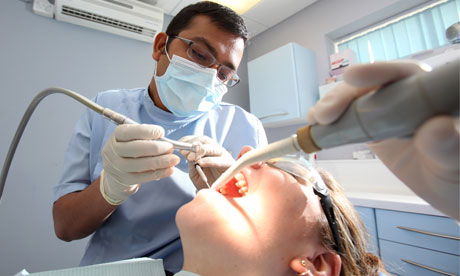As a private sector company gets set to take over £140m of community healthcare contracts, a local councillor explores what it will mean for patients in Suffolk
Serco will run £140m of community healthcare contracts including specialist dentistry and district nurses in Suffolk. Photograph: Graham Turner for the Guardian
NHS Suffolk recently announced that it has chosen Serco to run £140m of community healthcare contracts in Suffolk. This includes community hospitals, district nurses, specialist dentistry and a range of other non-acute services.
Serco will be working with a variety of partners, among these South Essex Partnership University NHS foundation trust and Bedford Community Dentistry, a community interest company.
In my role as a local councillor, I understand that feelings here are mixed. Obviously, the die-hard NHS people are very sorry about this, and dis-spirited. Few wish to work for a private company and Serco has a lot of work to do to bring these people round. The unions, predictably, are up in arms, perhaps they will look back with regret at their negative stance towards the social enterprise option when this was on the table a couple of years ago.
And, of course, there are those of us, often at the sharp end of poor NHS community services who know that Serco probably won't be that much worse than what we got before. Last year, I spent, or rather wasted, quite a lot of time trying to get a service for my son from the NHS. In the end, the NHS spent far more than the cost of his service telling him he couldn't have one. At least not before the problem got four times more expensive to fix. Exasperated I gave up and spent a grand getting him sorted privately.
For this reason, part of me cheered to hear the NHS had, in this case, lost it right to provide.
But will Serco, really be any better? What has it got to bring to the party? For a start, it is promising to embrace new technologies to improve accessibility and support new working methods. This is designed to improve the 1980s working practices you see in most of the non-acute NHS sector. So a tick there.
They will also be promising to bring a greater level of efficiency and accountability to people delivering services.
This could be a good or bad thing, depending on how it is done. At the moment, most upward reporting doesn't really help matters and can make them worse. You just end up with processes upon processes. Indeed this is what, I suspect, got in the way of our son getting a service. They were so pre-occupied, one suspects, with resource-allocation issues. Clearly, this was where too much of the vital effort was going.
But, overall, my heart isn't lifted by Serco's coming. They represent an ethos that doesn't resonate with me – or I believe with most staff or NHS patients. You know that the system will be profit-maximising and it is likely that this will take priority. In any dispute over delivery between NHS Suffolk and Serco, I wouldn't bet on local David beating the global Goliath. In coming to Suffolk, Serco knows its risks are low.
Would matters have been better had Suffolk go down the social enterprise route, as it might have done a couple of years ago? Investment is now there for social enterprises to buy the new kit needed to improve delivery. I believe staff would have ultimately preferred this and invested freely into this, more readily buying into new working methods. A social enterprise would also be well-placed to involve resources beyond the state to improve health outcomes for patients, their families, communities and other agencies. And finally, of course, profits would be available to reinvest in healthcare in Suffolk.
Why my equivocation?
Well it's not because I don't think any of these arguments are not valid in and of themselves. I love social enterprise. In my professional life I help to create them. My hesitation is borne of the fact that not all new social enterprises in the healthcare sector have made these kinds of moves. Many have failed to invest quickly enough in new tech. They have not acted to improve their businesses fast enough to fend off competition. Culture remains mired in the old world of the NHS. Some are no better at engaging their communities than the NHS was.
Of course, there are some healthcare social enterprises that are doing brilliantly. I am privileged to work alongside many of them. But only the minority which are moving very quickly from NHS culture and practice are going to succeed. These organisations are investing in technology, growing their business and turning their trusted position in their communities to their advantage. Some are, sensibly, getting into social care to complement the health side of their work. Others are partnering with the local voluntary and community sector and local councils, setting up a range of provisions which both promote health and, crucially, entrench their commercial position within a local area.
This is what the CEOs and boards of all SE healthcare ventures need to be doing before it's too late and Serco sweeps into town.
Craig Dearden-Phillips lives in Suffolk, is managing director of Stepping Out Ltd and a county councillor in Suffolk
http://www.guardian.co.uk/healthcare-network/2012/apr/24/nhs-sufflolk-serco-patients

